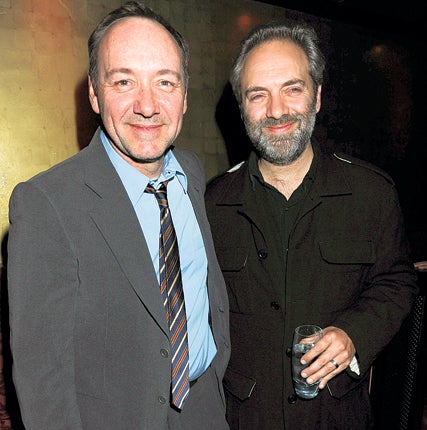The royal rogue that Spacey was 'born to play'

He is Shakespeare's gloriously Machiavellian monarch-in-waiting, who machinates and murders his way to the throne during the 15th-century Wars of the Roses.
Richard III, the "rudely stamp'd" hunchback, has been portrayed by the finest actors of the stage, including Laurence Olivier's turn as the last king to die on the battlefield after he is unhorsed, uttering the lines: "A horse, a horse, my kingdom for a horse!"
Now, it is Kevin Spacey's turn. The American actor and artistic director of the Old Vic Theatre in London, who has excelled at playing limping villains in the past, is collaborating with the British director Sam Mendes to bring Shakespeare's Richard III to life.
The two men last worked together in 1999 on Mendes' acclaimed film American Beauty, which landed an Oscar for both of them.
Yesterday, Mendes said he was thrilled to be working with Spacey again. He said Richard III was "a play I love and a role I think Kevin is born to play".
For his part, Spacey said he was "so excited" by the production. "Sam is one of the finest directors I have had the pleasure to work with and to gain this opportunity is beyond my wildest hopes," he said. "With such a remarkable character before me I have a feeling this one is going to be a memorable experience."
The play will begin its journey in New York, opening at the Brooklyn Academy of Music in February 2012, with a London opening at The Old Vic in May 2012, after which it will embark on a world tour.
While both Spacey and Mendes might now be most synonymous with their achievements in film, both were immersed in Shakespearean theatre at the start of their careers. Spacey's first professional stage appearance was in the New York Shakespeare Festival in 1981. Mendes, meanwhile, honed his talent as a director at the Royal Shakespeare Company.
Michael Boyd, the artistic director at the RSC who won an Olivier Award for staging the three parts of Henry VI with Richard III at the Young Vic in 2002, gave Mendes and Spacey his vote of confidence.
"It's a part that Kevin Spacey will take apart. I think he could have an absolute ball with it, and Sam Mendes's understanding of Shakespeare is really strong. He started out at the RSC and they will do a great job together."
Richard III was the King of England for two years, from 1483 until his death. He is depicted by Shakespeare as a profoundly jealous, ambitious and paranoid figure who had his brother Clarence killed, as well as the sons of the late king Edward IV, the "princes in the tower" who disappeared after being taken to the Tower of London.
British history records two major rebellions against Richard III; the first was in 1483, which collapsed, but the second, led by Henry Tudor (later King Henry VII) led to his death in the Battle of Bosworth.
Yet Richard III's reputation is considered to be much-maligned by some revisionists. Among other theories, they point to the fact that he was vilified by Tudor writers as being deformed, but the withered arm, limp and crooked back of legend are now believed to be fabrications.
The play is part of The Bridge Project, a three-year transatlantic partnership uniting The Old Vic with BAM and Neal Street Productions.
Richard's role models...
Laurence Olivier
Perhaps the best known film adaptation of Shakespeare's play is the 1955 version directed and produced by Sir Laurence Olivier, who also played the lead role.
Al Pacino
The actor first played the king when he was aged 39, on Broadway in 1979. He revisited the role in Looking for Richard, a 1996 documentary film, which he directed, and in which he starred.
Peter Cook
In the TV comedy, Blackadder, the king is portrayed by Peter Cook as a doting, kindly man who treats the princes in the tower with affection.
Richard Dreyfuss
In a play within a play in Neil Simon's 1977 film, The Goodbye Girl, he reluctantly portrays Richard III as overtly homosexual at the insistence of an avant-garde director. His performance won him an Academy Award.
Ian McKellen
The 1995 film adaptation is set in a 1930s fascist England. It was based on a stage production directed by Richard Eyre for the Royal National Theatre, which also starred McKellen.
Subscribe to Independent Premium to bookmark this article
Want to bookmark your favourite articles and stories to read or reference later? Start your Independent Premium subscription today.

Join our commenting forum
Join thought-provoking conversations, follow other Independent readers and see their replies